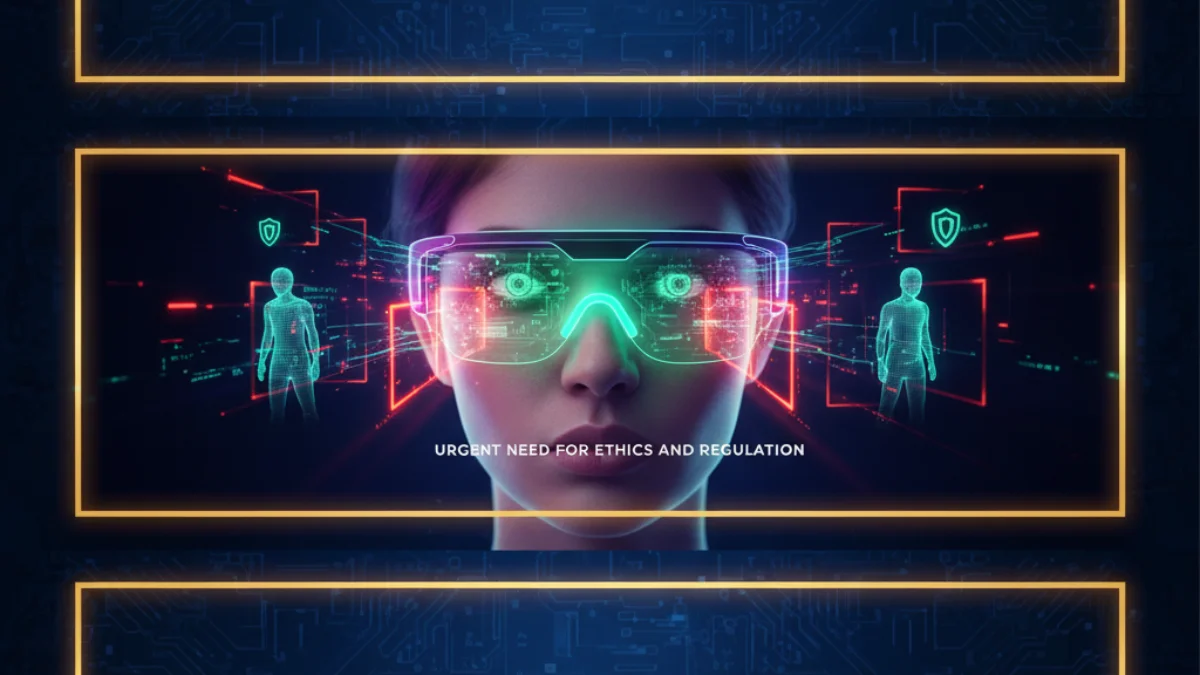Introduction
Picture this: You're sipping coffee in a crowded café, oblivious to the stranger across the room whose smart glasses are silently capturing your conversation, analyzing your outfit, and logging your location for some unseen algorithm. No red light flashes, no warning beepsjust the hum of everyday life, now laced with invisible surveillance. That's the chilling reality of AI-powered smart glasses, devices like Meta's Ray-Ban models that blend augmented reality with always-on cameras and microphones. Launched in earnest in 2023 and exploding in 2025 with features like real-time translation and object recognition, these wearables promise convenience but deliver a privacy nightmare. From Meta's April 2025 policy tweak removing voice recording opt-outs to Harvard dropouts' Halo X glasses recording every chat, the tech is advancing faster than safeguards.
As a journalist who's dissected tech's underbelly for Reuters and TechCrunch, I've seen how innovation often outpaces ethics-think facial recognition in stadiums or app trackers in your pocket. Smart glasses amplify this, turning public spaces into data mines where bystanders become unwitting subjects. Meta insists on LED indicators for recording, but as European regulators noted, a tiny light is no substitute for consent. In India, where the DPDP Act lags, or the U.S., with patchwork state laws, gaps abound. The 2025 conversation isn't just about features; it's about reclaiming control in a world where your face and words are currency. This piece probes the risks, regulatory voids, and ethical paths forward, drawing on fresh reports and expert voices to map a safer horizon.
The Privacy Minefield: Surveillance in Your Field of View
Smart glasses aren't just eyewear; they're mobile surveillance units. Meta's Ray-Ban glasses, updated in April 2025, now store voice recordings for up to a year to train AI, ditching opt-outs and sparking fury from the Irish Data Protection Commission. Users can snap photos, record videos, or query "What's this?" about surroundings, all feeding Meta's models. But the real terror is for bystanders-your conversation transcribed, your face tagged, your habits profiled without a whisper of permission. A 2025 Il Secolo XIX experiment showed two students identifying strangers' personal details in seconds, from social media links to family names, leaving victims stunned and vulnerable to fraud.
This isn't sci-fi. In Europe, GDPR demands consent for personal data, but smart glasses blur lines-public filming is often legal, yet private chats aren't. The Conversation notes Meta's policy expands AI data collection while photos/videos stay local, a loophole for voice. In the U.S., state wiretap laws require all-party consent, but enforcement is spotty. India's DPDP Act, still in draft, excludes bystander recordings, as Medianama reports, allowing users to claim "personal footage" even with others in frame. The fallout? Eroded trust in public life. Cybersecurity Advisors Network warns of "surveillance with plausible deniability," where footage fuels manipulation or deepfakes. eWeek's 2025 piece on Halo X glasses-always-listening for productivity-highlights workplace horrors: bosses capturing meetings covertly, breaching compliance like GDPR's explicit permission rules.
From my Reuters days covering EU probes into Meta's data practices, I recall the 2023 fine for facial recognition violations. Smart glasses scale that globally, with 2 million Ray-Bans sold since 2023. Forbes questions if this ushers a "post-privacy" era, where disconnection becomes impossible-glasses are medical necessities for millions, not optional gadgets. The IBA warns of legal liabilities: civil suits for invasion, criminal charges in private settings. Without checks, we're hurtling toward a world where every glance is a data grab.
Ethical Dilemmas: Consent, Bias, and the Human Cost
Ethics lag tech by miles. Who consents when a stranger's glasses scan you mid-stride? The Conversation argues AI integration turns glasses into "always-on" spies, processing voices and visuals for Meta's profit. Bystanders lack recourse-request deletion? Prove you were recorded. Bias creeps in too: AI facial recognition, 35% less accurate for darker skin (NIST 2019), amplifies discrimination, as WebProNews notes. In India, with 1.4 billion faces, this could entrench surveillance inequalities.
The human toll is profound. Laptop Mag reports Meta's 2025 Connect tease of Gen 3 glasses with controversial AI, sparking Reddit rants on "Black Mirror" dystopias. Users fear job loss from recorded slip-ups; victims dread identity theft from casual snaps. Privaini.com's 2025 post calls it "silent risks," urging privacy impact assessments. Burness Paull's Callum Sinclair flags recording without knowledge as a "serious challenge." For organizations, it's a minefield-OSHA's AI glasses for inspections (Fisher Phillips) could violate labor laws, capturing employees covertly.
I've interviewed privacy advocates who liken glasses to "invisible CCTV"-ubiquitous, untraceable. The 2025 debate isn't abstract; it's about reclaiming autonomy in shared spaces. Ethical frameworks demand transparency: mandatory audio cues, data deletion rights for bystanders. Without them, trust erodes, innovation stalls.

Regulatory Gaps: From GDPR to DPDP, Where Do We Stand?
Regulations scramble to catch up. Europe's GDPR mandates consent for personal data, but smart glasses' "personal footage" loophole persists, per Medianama's 2025 India analysis. The DPDP Act draft excludes bystanders, leaving no notification or erasure rights. U.S. state laws vary California's CCPA offers opt-outs, but federal voids loom. The FTC's 2025 push against "dark patterns" in subscriptions hints at wearables, but no specific rules.
Global calls grow: EU's AI Act (2024) classifies high-risk AI like facial recognition under strict scrutiny, fining Meta up to 6% of revenue. IBA's 2025 article demands clearer laws for wearable surveillance, citing GDPR gaps. In Asia, Singapore's PDPA 2020 requires consent for recordings, but enforcement lags. Experts like Carolina Milanesi (Creative Strategies) warn of "plausible deniability" in public filming. The fix? Bystander rights: automatic alerts, mandatory erasure, and bans on real-time sharing. Until then, glasses remain a regulatory blind spot.
Future Outlook: Balancing Innovation and Rights
Smart glasses herald augmented reality's daw-hands-free navigation, instant translation-but without ethics, they’re dystopian tools. Meta's 2025 policy, ditching voice opt-outs, signals profit over privacy, per TechCrunch. Solutions emerge: Cap_able's Manifesto Collection uses patterns to confuse AI cameras, a clever hack against profiling. Forbes envisions a "post-privacy" world, but advocates push back with "right to disconnect" laws.
From my TechCrunch reporting on AR's rise, the path forward blends tech with accountability: AI audits, consent beacons on glasses, and global standards like a UN privacy charter. Innovators must prioritize Apple's rumored 2027 glasses skip cameras for privacy, per Bloomberg. By 2030, with 500 million wearables, regulations will catch up, but only if we demand it now. The question isn't if glasses will dominate, but how we shape their gaze.
Conclusion
AI smart glasses promise a connected future, but their privacy pitfalls from silent recording to bias demand urgent ethical and regulatory fixes. As Meta pushes boundaries, consumers must advocate for consent and transparency. The line between innovation and intrusion blurs fast; let's redraw it before it's too late.

FAQ
-
What are the main privacy concerns with AI smart glasses?
Constant recording without consent, facial recognition biases, and data sharing for AI training without bystander rights. -
How does Meta's Ray-Ban glasses policy affect users?
The 2025 update removes voice opt-outs, storing recordings for a year to train AI, raising surveillance fears. -
What regulations apply to smart glasses in Europe?
GDPR requires consent for personal data, but loopholes allow "personal footage" claims, per the Irish DPC. -
Are there solutions to smart glasses privacy risks?
Yes, like Cap_able's anti-AI clothing patterns or calls for mandatory audio cues and erasure rights. -
What is the global impact of smart glasses on surveillance?
They enable "plausible deniability" recording in public, potentially eroding trust and increasing fraud risks. -
How can consumers protect themselves from AI glasses?
Opt for devices with clear indicators, advocate for laws, and use privacy-focused alternatives like Apple's camera-less models.

